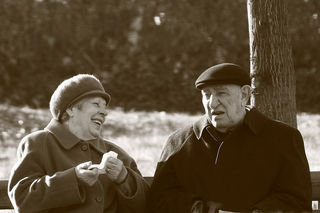Sex
Sexy-Agenarians
In an interview with Barry McCarthy, Ph.D., I talk sex after 60.
Posted August 30, 2016
My peers invariably cringe at my interest in adult sexuality. Discussions of the matter are almost always met with expressions of disgust (“Ew, stop!”), light character defamation (“You’re twisted.”), or a swift change in conversation.

A few things probably best explain their responses. Sex—just a general topic of discussion—tends to be at once deeply fascinating but explosively taboo. As a culture, we have adopted a sort of ‘don’t ask, don’t tell’ policy about the whole business, which, of course, stifles dialogues about sexual health for almost everyone at any age. To complicate matters, we also place a high social premium on youthfulness. So naturally, conversations about sex and aging represent the paragon of almost everything that is ungodly in this country.
“The United States are much less pro-aging and pro-sex than other countries,” offers Barry McCarthy, Ph.D., professor of psychology, certified sex therapist, and author of Rekindling Desire. “Consequently, the general message sent to older adults is: ‘You’re not supposed to be sexual—sex is for us (the young), not for you.’ For most people, it is embarrassing to think about people over 60 being sexual. It’s perceived as wrong.”
Charles Emlet, Ph.D. and social work professor at the University of Washington Tacoma agrees: “It’s easier and significantly more comfortable for us,” he says, “to imagine older adults as asexual, heterosexual, or at best—monogamous. But the science tells us that this just isn’t the case.”
These myths we propagate about late life sexuality—however comforting to our collective consciousness—are just that: mythological, untrue.
“With aging,” emphasizes McCarthy, “sexuality has a range of roles, meanings, and outcomes. And many of its features—desire, pleasure, eroticism, and satisfaction—can actually improve."
It appears that sex not only continues into the third act, but—like a fine wine—also evolves in its complexity, flavor, and very constitution with age. Cheers.
No Doubt, Sexual Function Changes with Age

Few can (or do) deny the effects aging has on sexual function—and the data don’t either. Findings from a nationally representative study of older adults support that prevalence of sexual activity does decline with age: from 73% among those aged 57 to 64, to 53% of respondents between 65 to 74, down to just over a quarter (26%) among adults 75 to 85 years.
This data isn't particularly surprising. After all, many people—particularly women—lose their sexual partner as they age. Poor health interferes with many aspects of sexuality. Plus, physiologic changes can affect the sexual response of men and women.
For women—the transition to menopause drastically reorganizes the endocrine system and often complicates sexual function. Resultant reductions in estrogen and testosterone (among other hormones) can lessen vaginal lubrication, elasticity, and sensitivity. Clinically, these hormonal changes translate to difficulties with arousal and desire, increased pain (vaginismus), or inorgasmia—inability to reach orgasm.
“There’s no doubt sex changes in later life,” explains McCarthy, “but when couples can learn to overcome the challenges of aging, they feel like they've really beaten the odds and that’s a real plus.”
For men, one such challenge is erectile dysfunction (ED). The most prevalent sexual problem among older fellas, ED occurs when the parasympathetic nerves to the penis don’t release enough Nitrous oxide. While estimates vary, around half of men over 40 experience some form of ED, with various physiological conditions—including diabetes, vascular and kidney disease, atherosclerosis—commonly implicated.
“One of the myths about sexuality in later life is that the only genuine sex is intercourse, and if you can’t have intercourse [because of ED], you have to stop being sexual,” McCarthy explains. “When older couples stop being sexual, it is almost always the man’s decision—because he falls into a behavioral cycle of anticipatory anxiety, performance-oriented intercourse, embarrassment, and ultimately sexual avoidance. He says to himself, ‘I don’t want to start something I can’t finish.’”
McCarthy continues, “But the idea that intercourse is the essence of sexuality just isn’t true.”
Sex Doesn’t Have to Retire with You—and It Doesn’t
Despite the precipitously aging population, and a massive market for drugs and devices aimed at treating its sexual problems, little information on the sexual behavior of older adults actually exists—in part because we are so terribly uncomfortable exploring it.
Among the few studies available on the matter, however, it appears that many older adults are anything but retired from sex.
Cross-cultural studies of couples in five countries—Brazil, Germany, Japan, Spain, and the United States—for example, demonstrate that couples continue to seek and value intimacy throughout their 60s and into their late adulthood.
Findings from a nationally representative sample corroborate this, indicating that a majority of older adults (78% of men aged 74 to 85, for example) engage in spousal or other intimate relationships and regard sex as an important part of life. A substantial number of individuals also reported having vaginal intercourse, oral sex, and masturbating even into the eight and ninth decades of their lives.
“The real question,” explains McCarthy, “is not if older adults are having sex. The question is whether sexuality is playing a positive 15-20% role in their lives—how and if sexuality is energizing them in new ways.”
Another heartening study finds that many seniors consider sexual activity essential to their well-being, happiness, and quality of life. Some are even finding their later years to be an exciting time to explore new dimensions of their sexuality.
Consistent with Carstensen’s theory of socioemotional selectivity, the findings support that a sense of impending mortality can inspire some older adults to cast aside their sexual inhibitions and the stereotypes that once constrained their behavior when they were younger.
“I’ve had many older clients tell me: ‘I like being sexual with my partner so much more now than when I was younger. The sex is more genuine, more human, more interactive. We take our time,’” notes McCarthy.
Change Isn’t Bad, It’s Just Different

While sexual function may be reduced, research shows that sexual satisfaction remains quite high throughout adults’ 60s, 70s, and 80s.
“Desire is the core issue,” argues McCarthy, “and there is no illness or disability that takes away sexual desire; illness and disability just change sexual function. I believe most adults can learn how to adjust to the new level of function,” he explains.
One way of meeting the challenges of aging involves shedding beliefs of sex as an individual, orgasm-based performance in favor of attitudes embracing sex as a team sport.
“Seeing the partner as an erotic, sexual friend—a teammate—is a key predictor of healthy sexual function for adults over 60,” explains McCarthy. "When we’re younger, sex is typically easy and predictable. But with aging, sex becomes increasingly more partner-based as physiological, physical, and psychological challenges arise within the dyad.”
ED-related complications best illustrate this idea.
“Men, for example, typically begin their sex lives as autonomous, sexual functioners,” he says. “Particularly when they are younger, men can experience strong, consistent, and reliable erections without a partner's help.”
But such is typically not the case for most men after 60, when autonomous erections are less reliable and the need for partner stimulation becomes critical, argues McCarthy.
“For the perhaps the first time in their adult lives,” he explains, “many men begin to recognize sex as an erotic, cooperative, team-based exercise—not an individual, performance-oriented, orgasm sport."
As a result, the focus shifts off intercourse and onto intimate, pleasure-oriented touch.
“For many older adults, these changes say: ‘You need me now in ways that you didn’t before, when you were younger and your erections could happen without me.’ So, intimacy grows,” McCarthy explains.
“Through touching and being touched, we are affirming and being affirmed,” he adds. “That’s why, though sex is not the most important thing in life or even in a relationship, it can be emotionally expensive to the couple when they stop being sexual. When touch is lost, so too is part of the couples’ sense of connection and vitality."
Clinical Implications

For this reason, when working clinically with older adults, McCarthy emphasizes the importance of recognizing that ‘one size never fits all’ and clarifying that there isn’t only one way to be sexual.
Promoting openness to asynchronous and erotic scenarios—like mutual masturbation, manual and rubbing stimulation—particularly when sex does not flow to intercourse, is critical he says. Encouraging couples to embrace psychological techniques, behavioral health habits, medical inventions, and psychosexual skills can also help individuals and couples to cultivate and maintain desire, pleasure, eroticism, and satisfaction into later life.
“The idea that one size never fits all is even truer when you age,” explains McCarthy. “There isn’t only one way to be sexual, because the essence of sexuality is giving and receiving pleasure, across the lifespan, in various ways.”
But before we can promote sexual openness, warns McCarthy, clinicians have to be able to talk about sex.
“The majority of practitioners are really uncomfortable talking about it,” he says. “Like dying, sex is just one of those topics that doctors don’t want to discuss. Part of that, of course, is personal discomfort. The other part is that sex and sexual problems are complicated and often can’t be solved with a single intervention,” he adds.
That means it’s also very important for clinicians to ask patients questions, and ask them early.
“When you ask questions like: ‘When in your relationship did pleasure, eroticism, desire, and satisfaction function best?’ or ‘Now that you’re older, how are those things operating in your relationship?’ or ‘Do you want to talk about it?’—you are signaling to your clients that you are an approachable, askable clinician. You’re modeling openness for your clients,” argues McCarthy.
And while clients may not always answer these questions, they at least deserve the opportunity to be asked, he says.
“They’re still human after all."
References:
Carstensen, L. (1992). Social and emotional patterns in adulthood: Support for socioemotional selectivity theory. Psychology and Aging, 7, 331–338.
Heiman, J., Long, J., Smith, S., Fisher, W, Sand, S., & Rosen, R. (2011). Sexual satisfaction and relationship happiness in midlife and older couples in five countries. Archives of Sexual Behavior, 40, 741–753.
Lindau, S., Schumm, L., Laumann, E., Levinson, M., O’Muircheartaigh, C., & Waite, L. (2007). A study of sexuality and health among older adults in the United States. New England Journal of Medicine, 357, 762–774.
McCarthy, B., & Pierpaoli, C.M. (2015). Sexual Challenges with Aging: Integrating the GES Approach in an Elderly Couple. Journal of Sex & Marital Therapy, 41(1), 72-82. DOI: 10.1080/0092623X.2013.831004.




